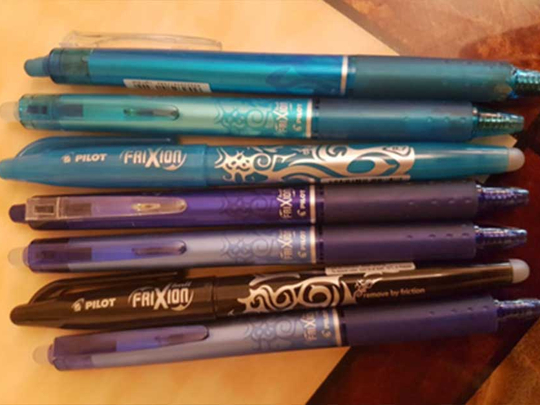
Sharjah: Sharjah Police have warned residents against using someone else’s pen when signing cheques as they have registered cases of the ink getting erased and fraudsters presenting the cheques to banks after entering new amounts.
The pens involved are varieties of the Uniball and Frixon brands, police said.
Most of the cases registered with police are regarding customers of banks falling victims to representatives of banks, who have targeted business owners and car dealers.
The representatives allegedly would issue customers a debit or credit card against a cheque, while offering their pen to write the cheque amount. Later, as the ink disappeared, they would change the value of the cheque.
Brigadier Dr Abdul Qader Mohammad Al Ameri, consultant and head of the Criminal Laboratory Department at Sharjah Police, said the department has cutting-edge equipment and expertise to crack such cases and identify what was written originally before the changes were made.
Syed Shaaban, an anti-counterfeiting expert at the police laboratory, said the ink in the forgery cases came from Uniball pens, or pens whose ink vanished when exposed to heat.
He added that most of the previous forgery cases involved criminals linked to the jobs or organisations where the transactions took place. For example, in visa forgery, the suspect would be working in the residency and foreign affairs department; in currency cases, the suspect would be linked to the bank concerned.
Other forgery cases
Shabaan said in one case, a man signed a blank cheque 15 years ago when he started a business with his partner. The partner took advantage of the blank cheque, wrote Dh12 million on it and deposited it in the bank.
The owner of the cheque denied he wrote such a big amount on the cheque, but confirmed that the signature on the cheque was his own. However, he claimed his signature changed over 15 years.
The section managed to discover that the partner had forged the cheque.
In another case, an Arab man whose wealthy father passed away forged documents to prove his father had given him and his sister all the wealth. The grandmother, who lived outside the UAE, rejected the documents and lodged a complaint saying that her grandson had forged the document.
When the case documents were referred by public prosecution to the forensic lab, it was found that the father used to sign blank papers before going on travel. The son took one of the signed papers and made a document stating that the father had pledged him and his sister the wealth. The forensic experts managed to prove that the signature was old while the written words in the paper were recent, and were added after the date of the father’s death.












